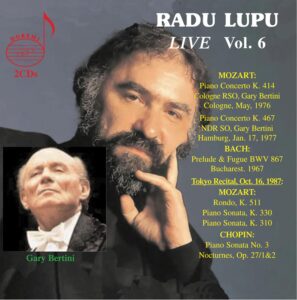The sixth volume in Doremi’s ongoing releases of live archival material with Radu Lupu features a previously unpublished recital that took place in Tokyo on October 16, 1987, encompassing works by Mozart and Chopin that the late pianist did not record commercially.
The outer movements of Mozart’s A minor sonata reveal a wider variety of articulations and nuances in comparison with the 1970 Aldeburgh Festival performance issued in this series’ second volume. By contrast, the relative sense of restraint in K. 330’s outer movements evokes something of Walter Gieseking’s Apollonian approach, although Lupu’s sonority opens up and gains vocally informed warmth in the central slow movement. Some listeners may find the A minor Rondo’s full-bodied rhetoric more fitting for Brahms than Mozart, yet who can resist such ravishing pianism?
Lupu may have avoided Chopin in the studio, yet he plays the B minor sonata wonderfully well. He justifies his liberal rubatos in the first movement’s second subject by way of illuminating the music’s contrapuntal substance, paying uncommon attention to the bass lines.. The latter also holds true in the Scherzo’s Trio, where one hears more detailed voice leading than in most performances. The perfectly paced Largo’s cantabiles sing out to every seat in the venue, retaining definition at every dynamic. Richard Wagner’s notion of Chopin being a “right hand composer” is thoroughly dispelled by Lupu’s intelligent voicings and canny phrasing throughout the Finale.
He sustains the C-sharp minor Nocturne’s outer sections’ brooding mood, but slightly underplays the central climax. Conversely, he sometimes presses the D-flat Nocturne’s crescendos with impatience, yet gorgeously savors the quiet final moments.
Collectors familiar with Lupu’s 1974 studio recordings of the Mozart K. 414 and 467 concertos with Uri Segal and the English Chamber Orchestra will notice Gary Bertini’s stronger orchestral framework and more prominent woodwinds. Here Bertini arguably inspires more dynamism and spontaneous inflection on Lupu’s part. There’s more urgency, for example, in the K. 467 Finale’s give and take between soloist and conductor. Right before he states the theme, Lupu invests his sparse cadenza with more energy and shape than in the studio recording.
Lastly, a 1967 Bach Well-Tempered Clavier Prelude and Fugue in B-flat minor finds Lupu working hard to underline entrances (too hard, perhaps), and relying on the pedal to create long legato lines. In short, he’s playing Bach like César Franck. Still, you can tell that this 22-year-old pianist had something special. Self-recommending for Radu Lupu’s admirers and pianophiles alike.
































